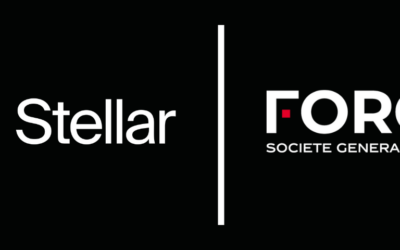PUBLICATION OF THE FIRST REPORT ON THE CARBON FOOTPRINT OF BLOCKCHAIN-BASED FINANCIAL INSTRUMENTS
Societe Generale-FORGE is publishing the first report on the carbon footprint of security tokens[1], produced by an independent consultancy, the Lamarck Group, with the review of independent third parties, the Institut Louis Bachelier, and the Crypto Carbon Ratings Institute (CCRI). This approach opens a new field of transparency in terms of sustainability by making it possible to measure the environmental impact of tokenized financial products1 and to contribute to the establishment of more sustainable practices.
Press release
Paris, November 22nd, 2023
Societe Generale-FORGE (SG-FORGE) has published a report on the carbon footprint of the entire life cycle1 of “Security tokens”[2], produced by the Lamarck Group, an independent consultancy, with independent third-party review by the Institut Louis Bachelier and the Crypto Carbon Ratings Institute (CCRI).
This pioneering approach aims to provide a general methodology for calculating the carbon footprint of a financial product issued in the form of a token on the Ethereum public blockchain infrastructure. The report also suggests improvements to the assessment of the carbon footprint of blockchain and recommendations for greater accuracy and reliability of data hosted on cloud infrastructure.
It points out that the carbon footprint of a digital bond for its entire life cycle (from its issuance, its management – including corporate actions – to its final redemption) on the blockchain is 0.82 kg CO2 (equivalent to 3.8 km by car). The report also looks at the relatively low greenhouse gas (GHG) emissions associated with the use of the Ethereum network since the blockchain protocol was changed in September 2022 (“The Merge”), reducing its electricity consumption by more than 99%.
This report, which is part of a drive for transparency and traceability, represents an important first step for the financial industry in terms of reporting. Issuers, investors, and service providers now have a measure of the carbon footprint generated by financial securities deployed on the blockchain. In the future, SG-FORGE intends to report, at the issuer’s request, on the estimated carbon footprint of its security token. This information will be available directly in the smart contract, enabling investors to measure the carbon emissions of the issuance infrastructure supporting the tokens of their portfolios.
“Blockchain and smart contracts have the potential to generate significant efficiency gains in the issuance and trading of financial instruments. Issuers and investors now also have access to a new measure of environmental impact. Our ambition with this initiative is to make it a market standard. » Jean-Marc Stenger, CEO at Societe Generale – FORGE
“ICMA welcomes member firms’ initiatives to promote automation and digitisation of capital markets and explore innovative ways to measure the carbon footprint of transactions underpinned by public blockchains. While experimentation is at early stages, the report has the potential to spark a broader debate on the environmental impact of technology in financial markets”, Georgina Jarratt, Head of FinTech and Digitalisation, International Capital Market Association (ICMA)
“DLT and tokenisation hold promise for driving growth and innovation in capital markets. A key element to the scaling of DLT-based capital markets on a sustainable basis are appropriate regulations based on thorough analysis of relevant data, including on carbon usage. AFME welcomes all members’ and other capital markets participants’ research which provides new data and insights on the workings of DLT and its environmental impact.” Association for Financial Markets in Europe (AFME)
“The original methodology used here, covering the entire life cycle of a financial asset tokenization project, is the result of joint work between Lamarck and Societe Generale-FORGE. While this measurement of the impact of financial infrastructures demonstrates the value of the shared and decentralized nature of public blockchain, it also sets an example for all financial players. We hope that this study will serve as a basis for further developments in measuring and reducing the carbon footprint of financial infrastructures.“ Thomas Boidot-Dorémieux, Director of Lab’ Innovation – Group Lamarck
“Blockchain infrastructure and tokenization will play a key role in tomorrow’s finance, which is why it is essential to develop scientific and qualitative methodologies for assessing environmental impact. We salute Societe Generale-FORGE’s commitment in this area and are pleased to have supported the teams in producing this report, which proposes concrete avenues and solutions.“ Dr. Christian Stoll, Co-founder of CCRI
“The support provided by the Institut Louis Bachelier focused mainly on the audit phase, which highlighted the innovative nature of the methodology used to assess the carbon footprint of a tokenization project on Ethereum. This report provides valuable information and will give stakeholders a comprehensive view of the carbon impact of the tokenization process implemented by Societe Generale-FORGE.“ Louis Bertucci, Researcher at the Institut Louis Bachelier
The full report is available in English [here]
Methodology:
The report reviews the current literature on assessing the carbon footprint of blockchain based on proof-of-stake and provides a general methodology for measuring the carbon footprint for the entire life cycle of a security token, from issuance through settlement and corporate actions to redemption. It provides a calculation of the carbon footprint of issuance on a public blockchain infrastructure and suggests improvements to the assessment of the blockchain’s carbon footprint and recommendations to cloud service providers to improve the accuracy and reliability of the data.
In particular, the report stresses that the various market players in the securities value chain (issuers, investors, custodians, central securities depositories, trading platforms, etc.) could conduct similar studies and share the results with their clients, regulators and potentially the general public in order to improve transparency on the carbon footprint and boost confidence in the efficiency of modern digital capital markets.
About Societe Generale-FORGE
Societe Generale-FORGE, a fully integrated and regulated subsidiary of Societe Generale Group, is licensed as an investment firm and authorized to provide MiFID 2 investment services under the supervision of the ‘Autorité de contrôle prudentiel et de résolution’ (ACPR) and under the control of the AMF and is registered as DASP (PSAN) by the AMF. Societe Generale-FORGE has built an open, secure and institutional-grade platform for digital assets operations, underpinned by full banking level safety and regulatory compliance. The solutions and digital assets developed by SG-FORGE comply with the CAST open-source interoperability and securitization frameowrk. For more information, visit www.sgforge.com and www.cast-framework.com.
About Crypto Carbon Ratings Institute
Crypto Carbon Ratings Institute is a research-driven company providing data on sustainability aspects of cryptocurrencies, blockchain and other technologies. The interdisciplinary team has built a multi-year research track record with a specific focus on cryptocurrencies and their sustainability impacts. CCRI uses the most up-to-date data sources as well as methods based on formerly peer-reviewed studies published in renowned scientific journals. CCRI provides insights that help their clients to understand and manage crypto-related ESG exposure. They serve a broad range of clients including institutional investors, exchanges and blockchain networks.
About Institut Louis Bachelier
The Institut Louis Bachelier (ILB) is an association, created in 2008 at the instigation of the French Treasury and Caisse des Dépôts. The DNA of the Louis Bachelier Network, comprising the ILB and two associated foundations (Fondation du Risque and Institut Europlace de Finance), is scientific research that promotes sustainable development in Economics and Finance. More than 60 programmes are currently housed within the Louis Bachelier Network, with a focus on four societal transitions: environmental, digital, demographic and financial. Activities aim to engage academics, private sector and public authorities in research programmes, as well as in scientific events and other forums.
About Lamarck Group
Established in 2014, Lamarck Group develops specialised and committed consulting to bring companies and organisations to finance a sustainable economy. Its science-centric approach is driven by its R&D Lab and then spread to its customers by its team made up of more than 220 experts. With offices in Paris, Lille and Bordeaux, as well as operations in Niort, Nantes, Marseille and Grenoble, Lamarck offers counselling on business and regulatory transformation for financial institutions and on transformation through innovation and technology (data governance, blockchain and cybersecurity) for various business activities.
Lamarck Group is a member of the Board of Directors of the Institut Louis Bachelier. It is a partner of COLLIBRA (Data Governance) and MARIGOLD (Blockchain / TEZOS). Lamarck is also a member of Croissance Plus, Finance-Innovation, Mouvement Impact France, Global Compact and Entrepreneurs d’avenir. Lamarck is a certified B Corp company since 2020 and is also a member of the BPI France/ADEME Green Rooster Community. For further information, visit: https://www.lamarck-group.com/
Press contacts
Ballou
Caroline de Frias, Astrid Amegnran, Thomas Duporge,
+33 1 42 22 24 10,
sg-forge@balloupr.com
Societe Generale
Amandine Grison, +33 1 41 45 92 40, amandine.grison@socgen.com
Sarah Cohen Lippe, +33 1 58 98 51 91, sarah.cohen-lippe@socgen.com
[1] This carbon footprint study has been considered purely from an infrastructure/technological perspective. These figures are based on the methodology, hypothesis and assumptions described in the report (i.e. 5-year digital bond deployed and registered by Societe Generale-FORGE on the Ethereum public blockchain). Source: https://impactco2.fr/
[2] A security token is a financial instrument (e.g. a bond, share or fund unit) that is issued, registered and transferred on a blockchain. These assets are legally considered and regulated as financial securities.




